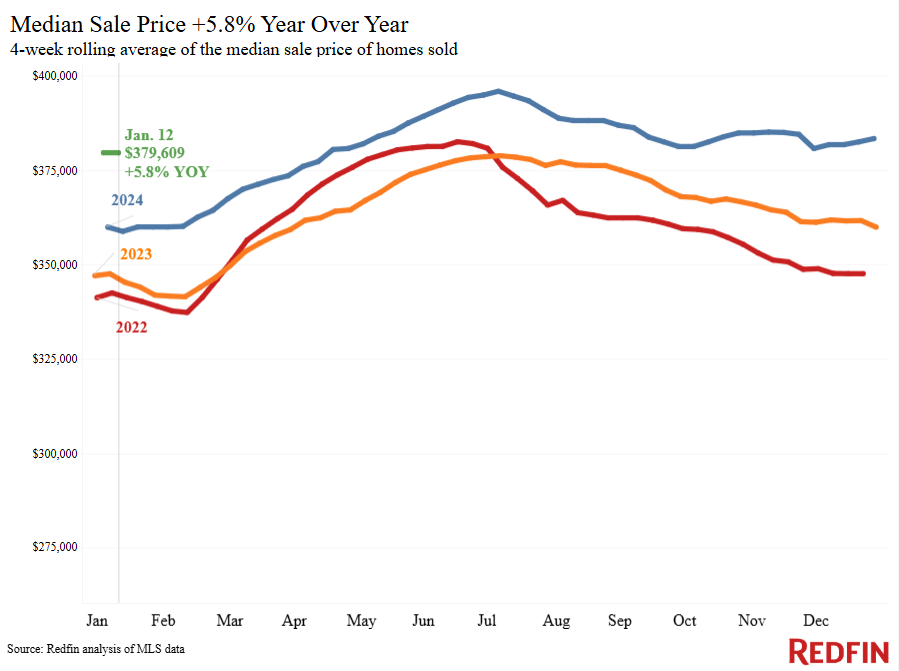Pending sales posted their biggest decline in over a year this week, as did new listings. But mortgage-purchase applications are on the rise, and mortgage rates are coming down.
Home tours and pending sales are falling as devastating wildfires burn in Southern California, extreme cold and snow hit the Northeast, Midwest and South, and housing costs rise across the country.
Redfin’s Homebuyer Demand Index–a seasonally adjusted measure of tours and requests for other buying services from Redfin agents–is down 11% month over month to its lowest level since August. Pending home sales fell 8.4% year over year during the four weeks ending January 12, the biggest decline since October 2023. Prospective sellers are also sitting on the sidelines, with new listings posting their biggest annual decline since September 2023.
But there are some pieces of encouraging news for homebuyers and the housing market. Mortgage rates are falling after the latest CPI report showed softer-than-expected core inflation, perhaps bringing some relief to hopeful buyers. And mortgage-purchase applications jumped this week to their highest level in nearly a year, signaling that pending sales may improve in the weeks to come. It’s also worth noting that it’s too early in the new year to determine how 2025’s housing market will shape up.
For now, high housing costs are one reason pending sales are declining. Many would-be buyers are priced out, with the median housing payment nationwide sitting at its highest level in over two months. Home sale prices are up 5.8% year over year, and daily average mortgage rates hit their highest level since May this week after a surprisingly strong jobs report before the CPI report reversed the course of rates.
Los Angeles wildfires push down sales, listings, but agents report people displaced from homes are scrambling to find housing
The wildfires are simultaneously pushing down homebuying demand and listings in the Los Angeles metro, and driving up buying and rental demand from the pocket of people who have been displaced from their homes. During the four weeks ending January 12, Los Angeles pending sales fell 4% year over year and new listings fell 2.5%. Redfin Economic Research Lead Chen Zhao said sales and listings in Los Angeles would have posted smaller declines if not for the fires, and that we will likely see bigger declines in the coming weeks.
But local real estate agents are reporting a surge in demand–especially for rentals–from people who have been directly impacted by wildfire damage. Many of the thousands of Los Angeles residents who have lost their homes are competing for rentals and listings in the area.
“There’s a feeling of overwhelming sadness and stress about the destruction we’re seeing in so many neighborhoods,” said Susan Brown, a Redfin Premier agent in the Los Angeles area. “Part of that is because so many people now have to find new homes, and we’re seeing a chaotic ripple effect in the market. I’ve personally had three people who lost their homes reach out to me to start searching, and we all have an influx of clients looking for rental properties. Many Redfin agents are pivoting to helping people find rentals as soon as possible. Because rentals are going so fast, my advice for people searching for housing is to directly reach out to a real estate agent for help.”
Cold, snow slowing housing market in the Northeast, Midwest
In much of the rest of the country, frigid temperatures and snow are keeping house hunters at home, and delaying homeowners from listing.
For Redfin economists’ takes on the housing market, please visit Redfin’s “From Our Economists” page.
Leading indicators
| Indicators of homebuying demand and activity | ||||
| Value (if applicable) | Recent change | Year-over-year change | Source | |
| Daily average 30-year fixed mortgage rate | 7.13% (Jan. 15) | Rates hit 7.26% this week, the highest level since May, then declined slightly | Up from 6.88% | Mortgage News Daily |
| Weekly average 30-year fixed mortgage rate | 6.93% (week ending Jan. 9) | Highest level since July | Up from 6.66% | Freddie Mac |
| Mortgage-purchase applications (seasonally adjusted) | Up 27% from 1 week earlier (as of week ending Jan. 10 ) | Down 2% | Mortgage Bankers Association | |
| Redfin Homebuyer Demand Index (seasonally adjusted) | Down 11% from a month earlier to lowest level since August
(as of week ending Jan. 12) |
Up 6% | Redfin Homebuyer Demand Index a measure of tours and other homebuying services from Redfin agents | |
| Google searches for “home for sale” | Up 35% from a month earlier (as of Jan. 13) | Down 4% | Google Trends | |
Key housing-market data
| U.S. highlights: Four weeks ending Jan. 12, 2025
Redfin’s national metrics include data from 400+ U.S. metro areas, and are based on homes listed and/or sold during the period. Weekly housing-market data goes back through 2015. Subject to revision. |
|||
| Four weeks ending Jan. 12, 2025 | Year-over-year change | Notes | |
| Median sale price | $379,609 | 5.8% | |
| Median asking price | $383,473 | 4.7% | |
| Median monthly mortgage payment | $2,586 at a 6.93% mortgage rate | 7.5% | Highest level since October |
| Pending sales | 49,136 | -8.4% | Biggest decline since October 2023 |
| New listings | 47,890 | -3.6% | Biggest decline since September 2023 |
| Active listings | 873,497 | 9.8% | Smallest increase in nearly a year |
| Months of supply | 4.6 | +0.3 pts. | 4 to 5 months of supply is considered balanced, with a lower number indicating seller’s market conditions. |
| Share of homes off market in two weeks | 22% | Down from 25% | |
| Median days on market | 50 | +6 days | |
| Share of homes sold above list price | 21.7% | Down from 23% | |
| Average sale-to-list price ratio | 98.2% | Essentially unchanged | |
|
Metro-level highlights: Four weeks ending Jan. 12, 2025 Redfin’s metro-level data includes the 50 most populous U.S. metros. Select metros may be excluded from time to time to ensure data accuracy. |
|||
|---|---|---|---|
| Metros with biggest year-over-year increases | Metros with biggest year-over-year decreases |
Notes |
|
| Median sale price | Milwaukee (20.4%)
Cleveland (14.1%) Warren, MI (13.1%) Pittsburgh (12.9%) Newark, NJ (12.9%) |
Austin, TX (-4.1%)
San Francisco (-3.1%) Tampa, FL (-0.5%) |
Declined in 3 metros |
| Pending sales | Anaheim, CA (1.8%)
New Brunswick, NJ (0.6%) |
Newark, NJ (-18.3%)
New York (-17.8%) Detroit (-16.7%) Minneapolis (-16.5%) Nashville, TN (-16.2%) |
Increased in 2 metros |
| New listings | San Jose, CA (13.1%)
Phoenix (12%) Seattle (9.5%) Jacksonville, FL (8.4%) Anaheim, CA (6.5%) |
Newark, NJ (-27%)
Detroit (-22.8%) Austin, TX (-20.8%) Warren, MI (-20.1%) San Antonio (-18.7%) |
Increased in 17 metros |
Refer to our metrics definition page for explanations of all the metrics used in this report.
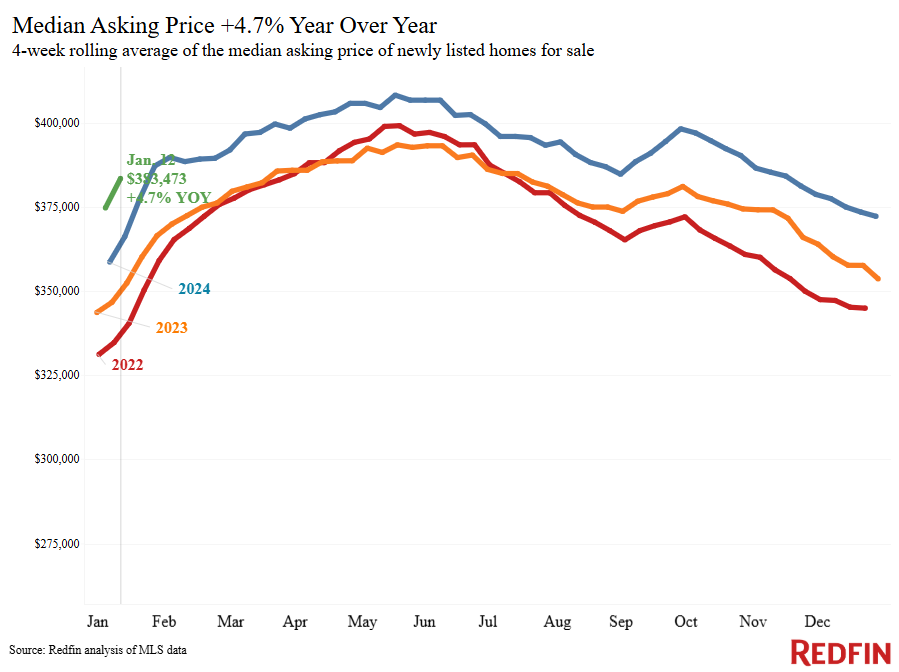
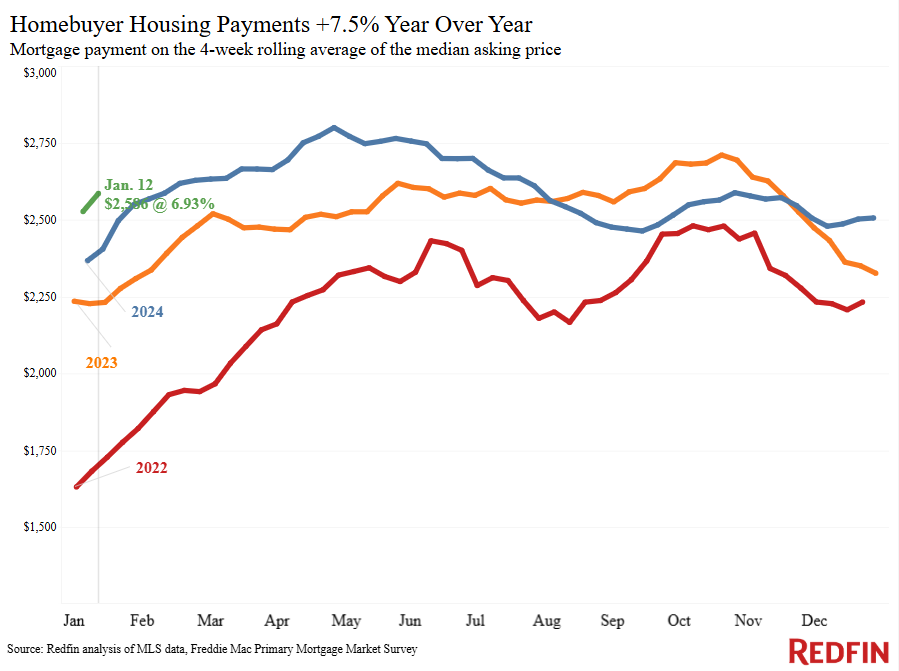

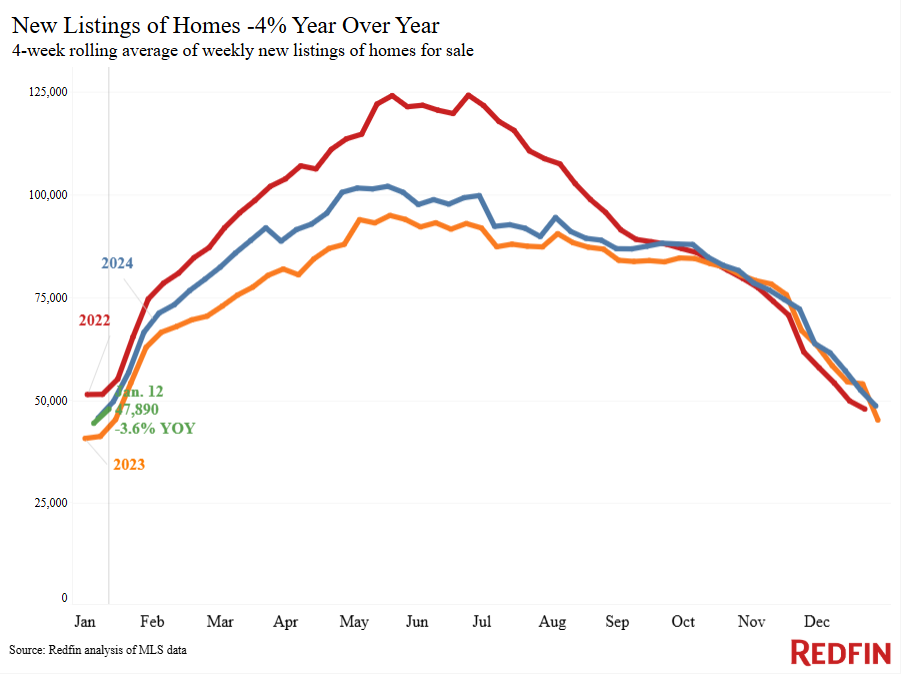
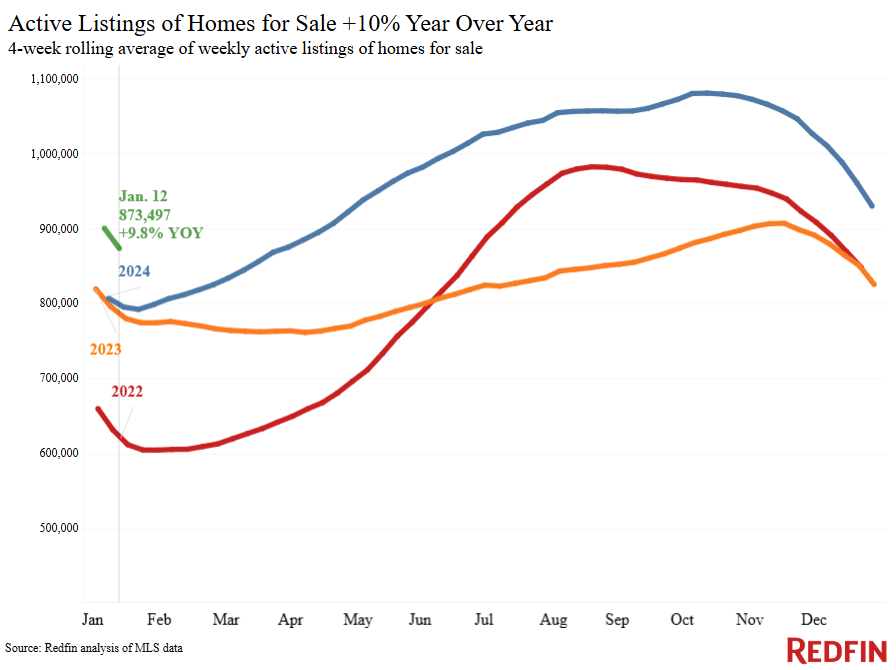
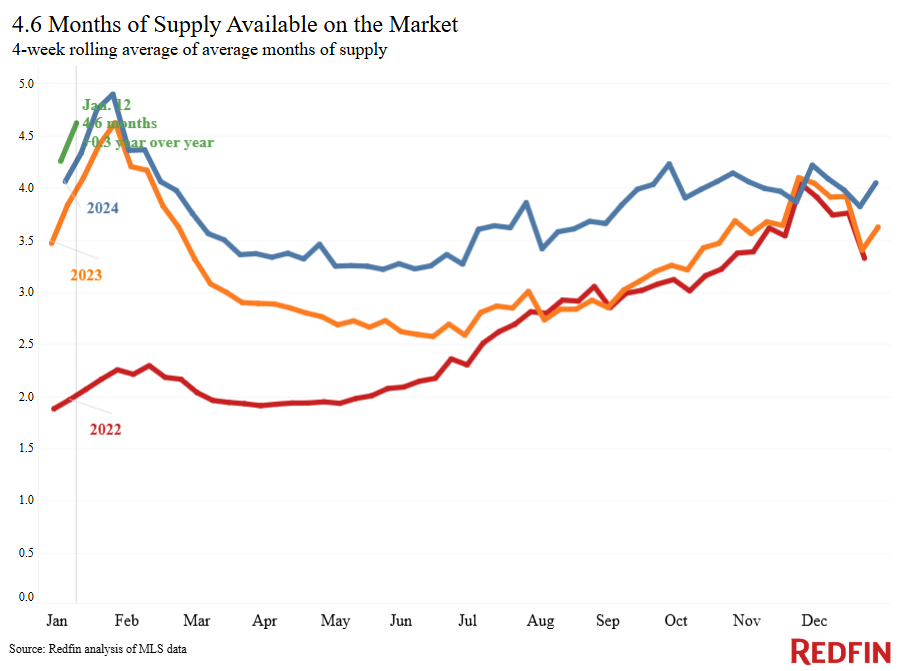
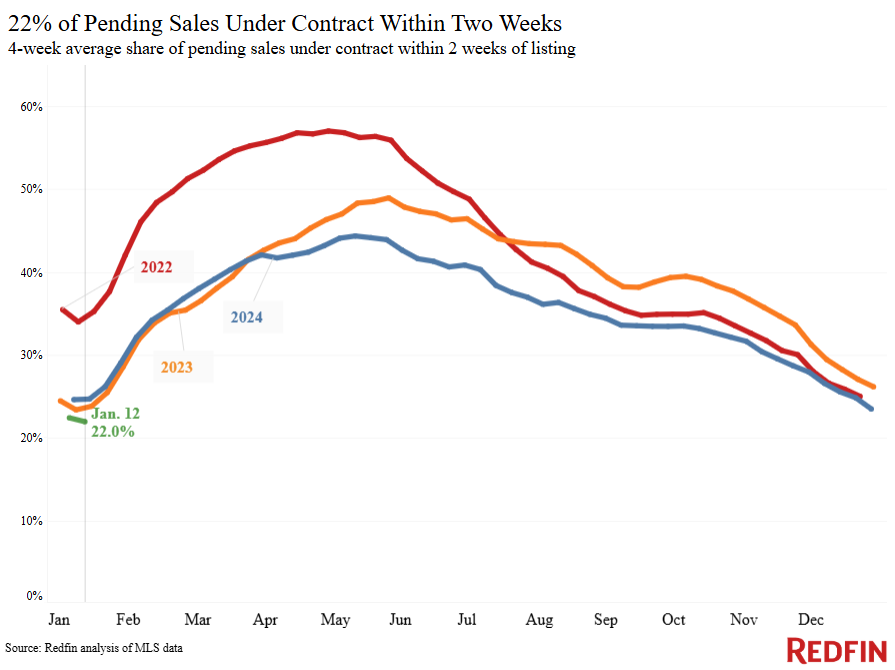
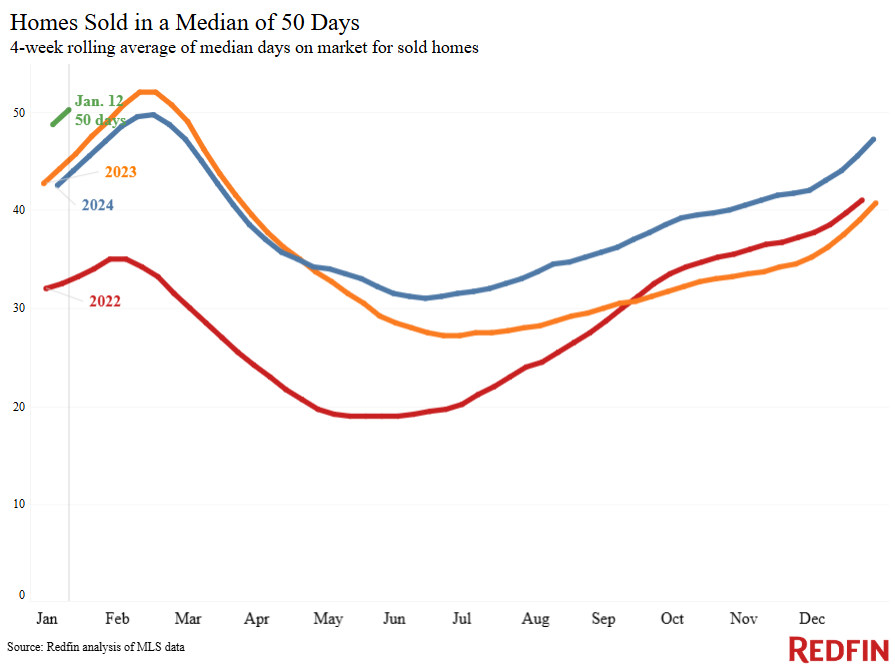
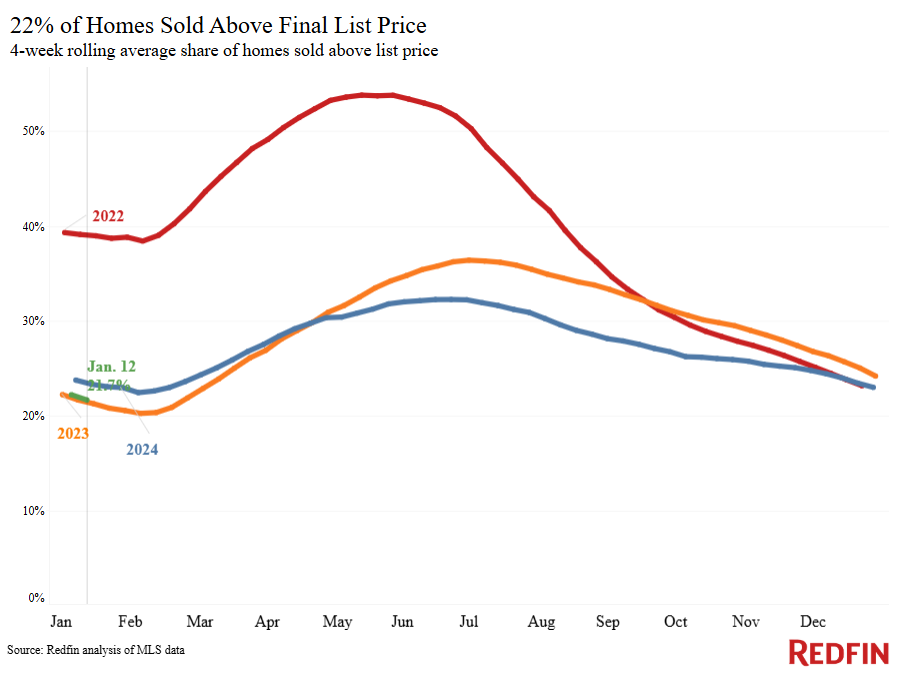
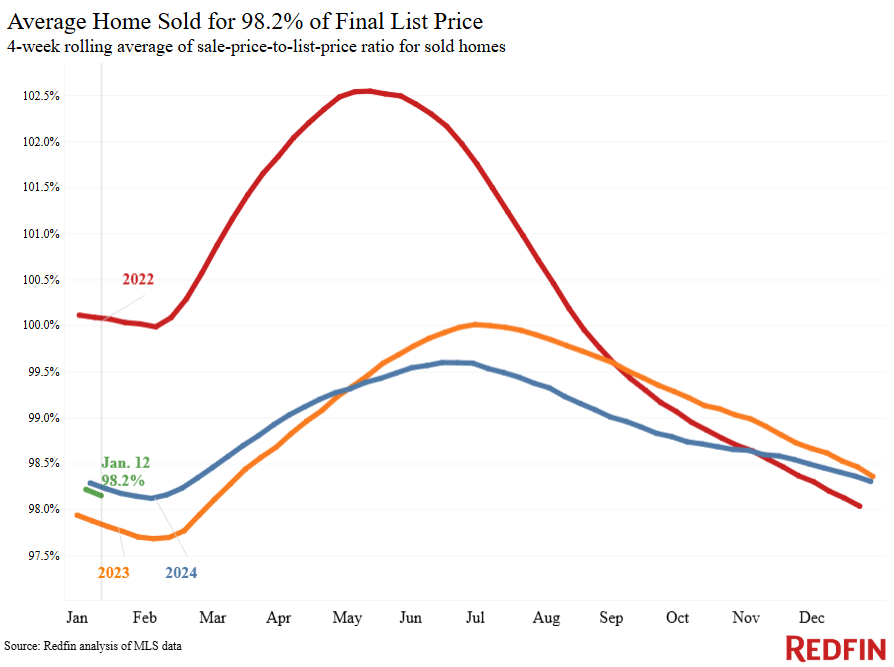
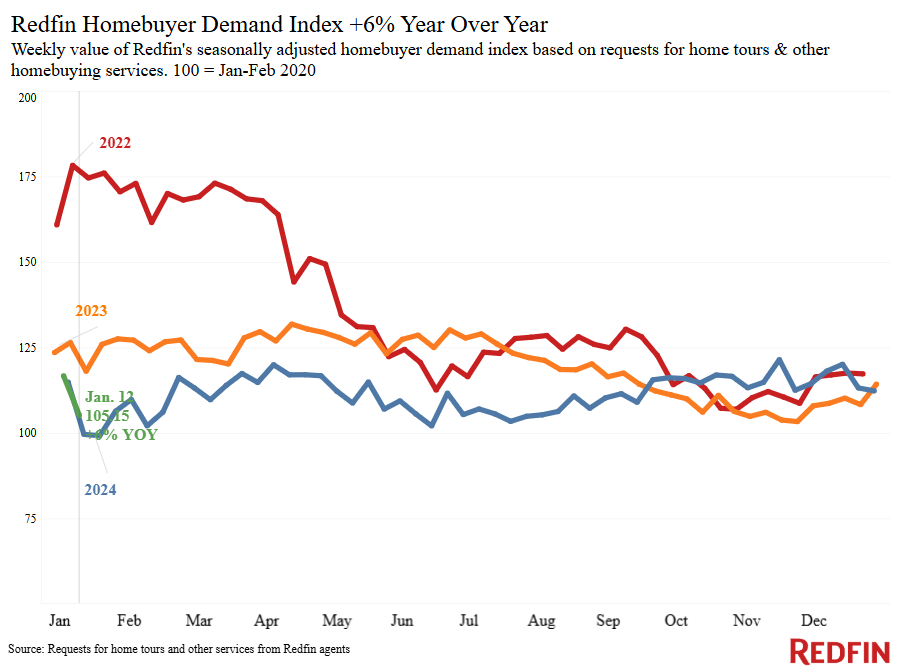
Written by: Dana Anderson

